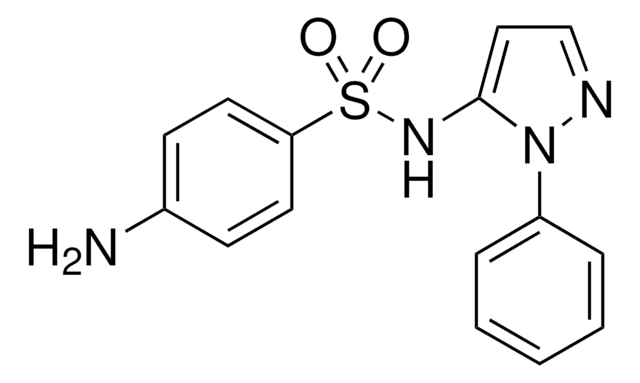A8106
Altanserin hydrochloride hydrate
≥98% (HPLC), solid
Synonym(s):
3-[2-[4-(4-Fluorobenzoyl)-1-piperidinyl]ethyl]-2,3-dihydro-2-thioxo-4(1H)-quinazolinone hydrochloride hydrate
About This Item
Recommended Products
Quality Level
Assay
≥98% (HPLC)
form
solid
solubility
DMSO: >5 mg/mL
H2O: insoluble
storage temp.
2-8°C
SMILES string
O.Cl.Fc1ccc(cc1)C(=O)C2CCN(CC2)CCN3C(=S)Nc4ccccc4C3=O
InChI
1S/C22H22FN3O2S.ClH.H2O/c23-17-7-5-15(6-8-17)20(27)16-9-11-25(12-10-16)13-14-26-21(28)18-3-1-2-4-19(18)24-22(26)29;;/h1-8,16H,9-14H2,(H,24,29);1H;1H2
InChI key
MFGBKMPKRJCLPK-UHFFFAOYSA-N
Application
Biochem/physiol Actions
Signal Word
Warning
Hazard Statements
Precautionary Statements
Hazard Classifications
Eye Irrit. 2
Storage Class Code
11 - Combustible Solids
WGK
WGK 3
Flash Point(F)
Not applicable
Flash Point(C)
Not applicable
Personal Protective Equipment
Regulatory Listings
Regulatory Listings are mainly provided for chemical products. Only limited information can be provided here for non-chemical products. No entry means none of the components are listed. It is the user’s obligation to ensure the safe and legal use of the product.
JAN Code
A8106-10MG:
A8106-BULK:
A8106-50MG:
A8106-VAR:
Certificates of Analysis (COA)
Search for Certificates of Analysis (COA) by entering the products Lot/Batch Number. Lot and Batch Numbers can be found on a product’s label following the words ‘Lot’ or ‘Batch’.
Already Own This Product?
Find documentation for the products that you have recently purchased in the Document Library.
Articles
Sigma-Aldrich offers many products related to serotonin receptors for your research needs.
Our team of scientists has experience in all areas of research including Life Science, Material Science, Chemical Synthesis, Chromatography, Analytical and many others.
Contact Technical Service
